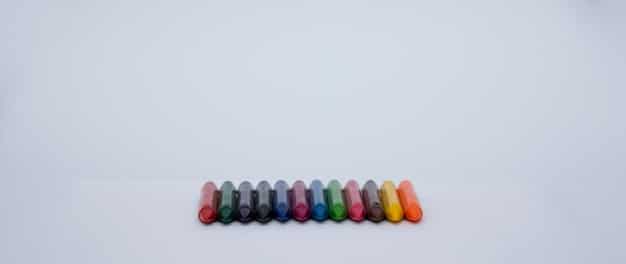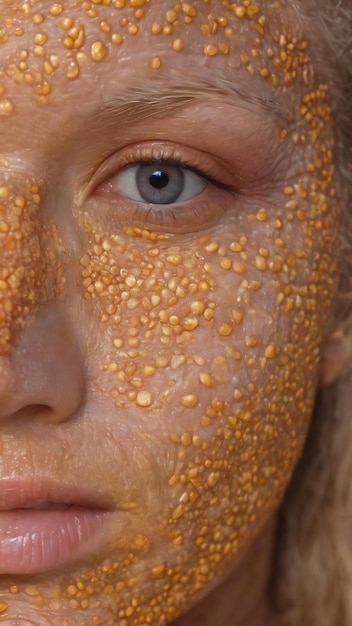Anti-Aging Supplements: Your Skin Type Guide 2025

Choosing the correct anti-aging supplement requires understanding your specific skin type and its unique needs to effectively address concerns like fine lines, wrinkles, and elasticity for optimal results in 2025.
Navigating the vast landscape of anti-aging products can be daunting, but discovering The Complete Guide to Choosing the Right Anti-Aging Supplement for Your Skin Type in 2025 is your first step towards a more informed and effective skincare regimen. This guide will demystify the process, helping you select supplements tailored to your skin’s unique characteristics, ensuring you invest in products that truly deliver on their promises.
Understanding Your Skin Type: The Foundation of Effective Supplementation
Before diving into the world of anti-aging supplements, a crucial first step is to accurately identify your skin type. This foundational knowledge dictates how your skin responds to various ingredients and helps in selecting supplements that will be most beneficial, rather than potentially irritating or ineffective. Our skin is a complex organ, and its characteristics can evolve over time due to factors like age, environment, and lifestyle.
Dry skin, for instance, often feels tight and flaky and may show fine lines more prominently due to a compromised barrier. Oily skin, on the other hand, is characterized by excess sebum production, leading to a shiny complexion and larger pores. Combination skin presents a mix of these, with oiliness typically in the T-zone and dryness elsewhere. Sensitive skin reacts easily to products, often manifesting as redness, itching, or stinging, while normal skin is well-balanced and rarely problematic.
Dry Skin: Rehydrating from Within
Individuals with dry skin often struggle with a lack of natural oils and moisture, making them more susceptible to the early signs of aging such as fine lines and a dull complexion. The goal for this skin type is to choose supplements that enhance hydration and fortify the skin’s natural barrier function.
- Hyaluronic Acid: Acts as a powerful humectant, drawing moisture into the skin.
- Ceramides: Essential lipids that help maintain the skin’s barrier, preventing moisture loss.
- Omega-3 Fatty Acids: Support overall skin health, reducing inflammation and improving hydration.
By incorporating these into your daily routine, you can help replenish lost moisture and improve skin elasticity, making it appear plumper and more youthful. Supplements specifically formulated with these compounds can significantly improve the comfort and appearance of dry skin, setting a resilient foundation against environmental stressors.
Oily and Acne-Prone Skin: Balancing and Clarifying
Oily skin types, while often appearing more youthful due to natural lubrication, are still prone to aging concerns, particularly if not properly managed. Excess oil can exacerbate issues like enlarged pores and inflammation, which can indirectly contribute to collagen breakdown over time. The key here is to find supplements that help regulate sebum production and reduce inflammation.
- Zinc: Known for its anti-inflammatory properties and ability to regulate oil glands.
- Vitamin A (Retinoids): Can help normalize cell turnover and reduce sebum production.
- Probiotics: Support a healthy gut microbiome, which can indirectly improve skin clarity and reduce inflammation.
Choosing the right approach means focusing on ingredients that promote a balanced complexion without over-drying, which can trigger even more oil production. Look for formulations that support overall skin health, mitigating both current issues and future aging signs.
Key Anti-Aging Supplement Ingredients and Their Efficacy
Once you are clear on your skin type, it’s time to explore the powerhouse ingredients that form the backbone of effective anti-aging supplements. The scientific community continues to uncover new benefits from various compounds, but some have stood the test of time, proving their efficacy through extensive research.
The beauty industry is flooded with claims, making it challenging to differentiate between fads and genuinely beneficial ingredients. Focusing on clinically studied compounds is paramount. These ingredients work in various ways, from boosting collagen production to fighting free radical damage, each playing a critical role in maintaining youthful skin.

Collagen and Peptides: The Building Blocks
Collagen is the most abundant protein in our skin, responsible for its structure, elasticity, and firmness. As we age, our natural collagen production declines, leading to wrinkles and sagging skin. Supplementing with collagen, particularly hydrolyzed collagen peptides, can help replenish these diminishing stores.
Peptides, smaller chains of amino acids, act as signaling agents, telling our cells to produce more collagen, elastin, and hyaluronic acid. They are vital for skin repair and regeneration. When choosing collagen supplements, look for types I and III, which are most abundant in skin. Peptides, on the other hand, come in many forms, with different specific functions, so researching their particular benefits is crucial.
- Hydrolyzed Collagen Peptides: Easily absorbed form that supports skin elasticity and hydration.
- Signal Peptides: Encourage the production of collagen and elastin.
- Carrier Peptides: Deliver trace elements essential for wound healing and enzymatic processes.
These ingredients are foundational for anyone looking to maintain or restore their skin’s youthful bounce and resilience. Their internal action complements topical treatments, providing a holistic approach to skin rejuvenation.
Antioxidants: Defending Against Environmental Damage
Oxidative stress, caused by free radicals from UV radiation, pollution, and other environmental factors, is a major contributor to premature aging. Antioxidants neutralize these free radicals, protecting our cells from damage and preventing the breakdown of collagen and elastin.
A broad spectrum of antioxidants is beneficial, as different antioxidants target different types of free radicals. Vitamins C and E are well-known powerhouses, but other compounds such as astaxanthin, resveratrol, and coenzyme Q10 (CoQ10) also offer remarkable protective benefits. Incorporating a variety of these can provide comprehensive defense for your skin.
- Vitamin C: Crucial for collagen synthesis and a potent antioxidant.
- Vitamin E: Works synergistically with Vitamin C to protect cell membranes.
- Astaxanthin: A super-antioxidant, far more potent than Vitamin E, offering exceptional protection against UV damage.
Choosing supplements rich in these antioxidants is a proactive step towards preserving skin integrity and radiance by mitigating daily environmental assaults. This preventative measure is an indispensable part of an anti-aging strategy.
Beyond Ingredients: Factors to Consider for 2025
While understanding ingredients is vital, the efficacy of anti-aging supplements in 2025 goes beyond just their composition. Several external factors and emerging trends play a significant role in how well a supplement performs and its overall value to the consumer. The landscape of health and wellness is constantly evolving, with new research and technological advancements influencing product development.
Consumers are becoming more discerning, demanding not only results but also transparency and ethical production practices. This shift towards conscious consumption means that the reputation of the brand, the quality of sourcing, and the scientific backing for claims are more important than ever. Furthermore, personalized nutrition is gaining traction, suggesting that a one-size-fits-all approach might be less effective.
Bioavailability and Formulation
An ingredient’s presence in a supplement doesn’t automatically guarantee its effectiveness. Bioavailability—the proportion of an active substance that enters the circulation unchanged and is available to exert its effects—is critical. A highly potent ingredient poorly absorbed by the body will yield minimal results.
Cutting-edge formulations in 2025 leverage technologies like liposomal delivery, microencapsulation, and sustained-release mechanisms to enhance ingredient absorption. For example, some collagen peptides are optimized for easier digestion and assimilation. Always look for supplements that explicitly state high bioavailability or use patented forms of ingredients known for superior absorption.
- Liposomal Delivery: Protects nutrients and enhances absorption into cells.
- Micronization: Reduces particle size for improved uptake.
- Active Forms of Vitamins: Ensures the body can readily utilize nutrients without conversion.
Investing in products with superior bioavailability ensures you get the most out of every dose, translating to more visible and lasting results for your skin. This attention to how nutrients are delivered is a hallmark of sophisticated supplement design.
Brand Reputation and Third-Party Testing
The supplement industry is not as strictly regulated as pharmaceuticals, making brand reputation and independent verification indispensable. A trustworthy brand will typically be transparent about its sourcing, manufacturing processes, and provide scientific backing for its products.
Third-party testing ensures that what’s on the label is actually in the bottle, and that the product is free from contaminants. Certifications from organizations like NSF International or USP (U.S. Pharmacopeia) indicate a commitment to quality and safety. Avoid brands that make grandiose claims without scientific evidence or hide behind proprietary blends without disclosing ingredient amounts.
Choosing supplements from reputable brands that prioritize quality and ethical practices protects your health and ensures you are investing in products that are safe and effective. This due diligence is a non-negotiable step in your journey toward better skin.
Targeted Support for Specific Skin Concerns
While generic anti-aging supplements offer broad benefits, a truly optimized regimen in 2025 incorporates targeted support for your most pressing skin concerns. This precision approach allows for a more potent and effective impact, addressing issues directly rather than merely superficially.
Whether you are battling stubborn dark spots, persistent redness, or a noticeable loss of firmness, there are specific ingredients and supplement combinations designed to tackle these challenges. Understanding these targeted solutions can significantly enhance your overall anti-aging strategy.
Addressing Hyperpigmentation and Uneven Skin Tone
Hyperpigmentation, including dark spots, sun spots, and melasma, is a common aging concern that can make the skin appear older and duller. While topical treatments are often the forefront of fighting discoloration, certain oral supplements can support the process by inhibiting melanin production and promoting a brighter complexion from within.
Ingredients like oral glutathione, proanthocyanidins, and specific forms of Vitamin C can play a role in achieving a more even and radiant skin tone. These work by reducing oxidative stress and modulating inflammatory pathways that contribute to pigment irregularities, offering synergistic effects with your topical agents.
- Glutathione: A powerful antioxidant that can help lighten skin and reduce hyperpigmentation.
- Grape Seed Extract (Proanthocyanidins): Offers strong antioxidant protection and can improve skin elasticity and tone.
- Oral Vitamin C: Supports collagen production and has a brightening effect on the skin.
By integrating these supplements, you can tackle hyperpigmentation from multiple angles, leading to more profound and lasting improvements in your skin’s overall clarity and brightness. This internal approach complements external treatments, accelerating desired outcomes.
Improving Skin Firmness and Elasticity
The loss of skin firmness and elasticity is a hallmark of aging, largely due to the degradation of collagen and elastin fibers. While collagen supplements are foundational, other ingredients can further enhance the skin’s structural integrity, leading to a visibly firmer and more resilient complexion.
Beyond collagen, consider supplements that promote the health of fibroblasts—the cells responsible for producing collagen and elastin—and those that protect these vital proteins from breakdown. Ingredients like silica, coenzyme Q10, and certain plant extracts can provide this additional support, reinforcing the skin’s architecture.
Silica, often overlooked, is crucial for strong connective tissue and improved skin elasticity. CoQ10, a powerful antioxidant, helps energize skin cells and protect against environmental damage, preserving firmness.

Lifestyle Factors and Holistic Anti-Aging
No anti-aging supplement, however potent, can counteract the effects of an unhealthy lifestyle. True anti-aging success in 2025 is predicated on a holistic approach that integrates high-quality supplementation with daily habits that support overall health and skin vitality. Supplements enhance, but do not replace, the fundamental pillars of well-being.
Your diet, hydration levels, sleep quality, stress management, and exposure to environmental aggressors all profoundly impact your skin’s appearance and biological age. Addressing these aspects concurrently with your supplement regimen creates a powerful synergy, maximizing results and promoting long-term skin health.
Diet and Nutrition: Fueling Youthful Skin
What you eat directly reflects on your skin. A diet rich in whole foods, fruits, vegetables, lean proteins, and healthy fats provides the essential nutrients your skin needs to repair, regenerate, and protect itself. Processed foods, excessive sugar, and unhealthy fats can lead to inflammation and oxidative stress, accelerating skin aging.
Consider a Mediterranean-style diet, known for its anti-inflammatory properties and abundance of antioxidants. Adequate protein intake is also crucial for collagen production, while healthy fats (like those found in avocados, nuts, and olive oil) support the skin’s lipid barrier and moisture retention. Supplements are designed to fill nutritional gaps, not compensate for a poor diet.
- Antioxidant-rich foods: Berries, leafy greens, colorful vegetables.
- Healthy fats: Avocados, nuts, seeds, fatty fish (omega-3s).
- Quality proteins: Lean meats, poultry, fish, legumes.
By prioritizing a nutrient-dense diet, you provide your skin with the intricate building blocks it needs, making your anti-aging supplements even more effective. This internal nourishment is key for radiance that truly glows from within.
Hydration, Sleep, and Stress Management
These three often-overlooked factors are profoundly intertwined with your skin’s health and its ability to repair and rejuvenate. Dehydration can make fine lines more prominent and skin appear dull. Aim for at least 8 glasses of water daily, more if you are active or in a dry climate, to maintain skin plumpness and elasticity.
Quality sleep is when your body, including your skin, repairs itself. During deep sleep, growth hormones are released, aiding in cell regeneration and collagen production. Chronic sleep deprivation can lead to increased cortisol levels, which can break down collagen. Similarly, chronic stress elevates cortisol, contributing to inflammation, acne, and premature aging. Incorporating stress-reducing practices like meditation, yoga, or spending time in nature is crucial.
By consciously managing your hydration levels, prioritizing consistent, restorative sleep, and actively practicing stress reduction techniques, you create an optimal internal environment for your skin to thrive. These foundational habits are indispensable partners to any anti-aging supplement regimen, amplifying their benefits and cultivating genuine, sustainable youthfulness.
Customizing Your Anti-Aging Regimen for 2025
The journey to youthful, radiant skin is deeply personal. In 2025, the most effective anti-aging strategies move away from generic solutions towards highly customized regimens that consider individual skin types, concerns, and lifestyle. This personalized approach not only maximizes results but also ensures that your efforts are both efficient and sustainable.
Crafting your ultimate anti-aging plan involves a dynamic interplay of understanding your body, selecting the right supplements, and maintaining a holistic lifestyle. It’s about empowering yourself with knowledge to make informed decisions that resonate with your unique needs, rather than chasing every new trend.
A Personalized Approach to Supplement Stacking
Once you’ve identified your skin type, primary concerns, and understood the key ingredients, you can strategically “stack” supplements. Stacking involves combining different supplements that work synergistically to address multiple aspects of skin aging. For example, someone with dry, aging skin might combine hyaluronic acid, collagen peptides, and omega-3s.
For oily, acne-prone skin that is also showing signs of aging, a combination of zinc, a well-formulated Vitamin A supplement, and probiotics might be more appropriate. Always introduce supplements one at a time to monitor your body’s response, and consult with a dermatologist or healthcare professional, especially if you have underlying health conditions or are taking other medications.
- Dry Skin Stack: Collagen + Hyaluronic Acid + Ceramides.
- Oily Skin Stack: Zinc + Vitamin A + Probiotics.
- Combination Skin Stack: Targeted approach based on specific zone needs, perhaps a collagen base with specific antioxidants.
This tailored stacking ensures that each supplement you take contributes meaningfully to your skin health goals, creating a powerful regimen designed specifically for you. By avoiding unnecessary supplements, you optimize both efficacy and cost.
Monitoring Progress and Adjusting Your Regimen
Anti-aging is not a static process; your skin’s needs can change over time due to seasonal variations, age, and new life events. Therefore, regularly monitoring your progress and being willing to adjust your supplement regimen is crucial for long-term success. Keep a skin journal, take progress photos, and pay attention to how your skin feels and looks.
If a supplement isn’t delivering the expected results after a reasonable period (typically 2-3 months), consider whether it’s the right fit for you. Perhaps the dosage needs adjustment, or a different ingredient combination might be more effective. The beauty of a personalized approach is its flexibility and responsiveness to your evolving needs, ensuring your anti-aging strategy remains effective in 2025 and beyond.
Continuously evaluating your regimen fosters a deeper understanding of your skin and empowers you to make informed decisions for its sustained health and youthful appearance. This iterative process is the cornerstone of truly effective and personalized anti-aging care.
| Key Point | Brief Description |
|---|---|
| 🔬 Identify Your Skin Type | Crucial first step to tailor supplement choices for optimal results and avoid irritation. |
| ✨ Key Ingredients | Focus on research-backed compounds like collagen, peptides, and antioxidants. |
| ⬆️ Bioavailability Matters | Choose formulations that ensure maximum absorption for effective results. |
| 🌿 Holistic Approach | Supplements complement diet, hydration, sleep, and stress management for best outcomes. |
Frequently Asked Questions About Anti-Aging Supplements
To accurately determine your skin type, observe your skin’s characteristics throughout the day. After washing your face, note if it feels tight (dry), gets oily quickly (oily), or has a combination of both (combination). Sensitive skin often shows redness or irritation easily. This understanding guides your supplement choices.
Yes, quality anti-aging supplements can make a visible difference, especially when used consistently and combined with a healthy lifestyle. Ingredients like collagen and antioxidants support skin structure and protect against damage, leading to improvements in elasticity, hydration, and overall appearance over time. Patience and consistency are key.
While generally safe, some individuals might experience mild side effects like digestive upset or allergic reactions to certain ingredients. It’s crucial to read labels, start with lower doses, and consult with a healthcare professional or dermatologist, particularly if you have pre-existing conditions or are on other medications.
The time frame to see results varies widely depending on the supplement, individual metabolism, and the specific skin concern being addressed. Generally, it can take anywhere from 2 to 6 months of consistent use for visible improvements in skin texture, hydration, and firmness. Patience and adherence to the regimen are essential.
Yes, it is highly recommended to consult with a dermatologist or healthcare provider before starting any new supplement regimen. They can provide personalized advice based on your health history, current medications, and specific skin concerns, ensuring the supplements chosen are safe and appropriate for you.
Conclusion
Embarking on the journey of choosing the right anti-aging supplement for your skin type in 2025 is an investment in your skin’s future and your overall well-being. By understanding your unique skin characteristics, delving into the science behind key ingredients, and committing to a holistic approach, you can unlock a truly effective and personalized anti-aging regimen. This comprehensive guide has provided the tools and knowledge necessary to navigate this exciting landscape, empowering you to make informed decisions that lead to visibly healthier, more radiant, and resilient skin. Remember, consistency, patience, and a thoughtful approach are your closest allies in achieving lasting youthful vitality.





